Unit11复习学案
【珍藏精品】2011届高考第一轮总复习经典实用学案:高二册Unit11

Ⅴ.重点语法 重点语法 Word Formation 1(构词法 构词法1) 构词法
Ⅰ.词汇聚焦 词汇聚焦 1.failure n. [U]&[C]失败 . 失败→v. fail 失败
[思维拓展 思维拓展] 思维拓展 end in failure以失败告终 以失败告终 a complete failure一个彻底失败的人 一个彻底失败的人 fail to do sth.未能做成某事 未能做成某事 Words fail me.我气得说不出话来。 我气得说不出话来。 我气得说不出话来 [指点迷津 指点迷津] 指点迷津 failure与success均为不可数名词,表示抽象意义“失 与 均为不可数名词, 均为不可数名词 表示抽象意义“ 败”和“成功”;但表示“失败(成功 的人或事”,则为 成功” 但表示“ 失败 成功)的人或事” 成功 的人或事 可数名词,可以与不定冠词 连用 连用。 可数名词,可以与不定冠词a连用。
[答案 答案] 答案 1.announcer; announcement . 7.supporter . anic 3.agent 4.arrangement 5.privacy 6.achievement .
Ⅲ.重点短语 重点短语 1.______ sb. to do sth. 使某人能做某事 . 2.______ the field of 在……领域 . ……领域 3.______ disease 致命的疾病 . 4.______ a breakthrough 做出突破 . 5.______ one’s goal 实现某人的目标 . ’ 6.be excited ______ 对……感到激动的 . ……感到激动的 7.a growing ______ of 越来越多的 . 8.aim (sth.) ______ 针对;瞄准 . 针对;
人教版英语七年级下册【推荐】Unit11Howwasyourschooltrip(学案2)
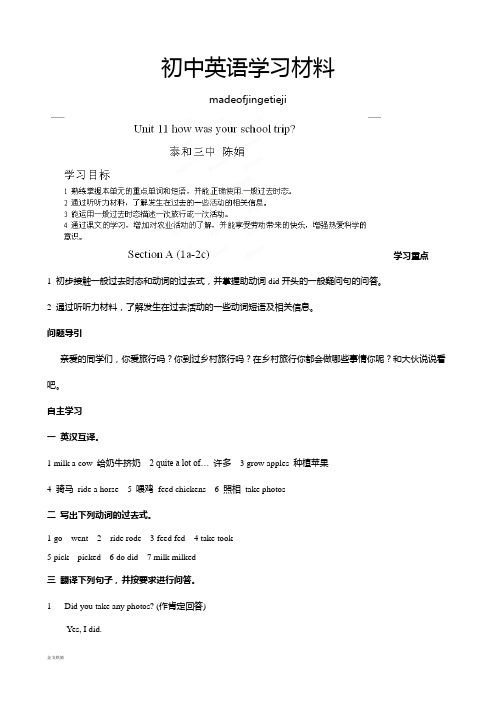
初中英语学习材料madeofjingetieji学习重点1 初步接触一般过去时态和动词的过去式,并掌握助动词did开头的一般疑问句的问答。
2 通过听听力材料,了解发生在过去活动的一些动词短语及相关信息。
问题导引亲爱的同学们,你爱旅行吗?你到过乡村旅行吗?在乡村旅行你都会做哪些事情你呢?和大伙说说看吧。
自主学习一英汉互译。
1 milk a cow 给奶牛挤奶2 quite a lot of… 许多3 grow apples 种植苹果4 骑马ride a horse5 喂鸡feed chickens6 照相take photos二写出下列动词的过去式。
1 go went2 ride rode3 feed fed4 take took5 pick picked6 do did7 milk milked三翻译下列句子,并按要求进行问答。
1 --- Did you take any photos? (作肯定回答)--- Yes, I did.2 ----Did they grow apples? (作否定回答)---- No, they didn’t.3 ---- Did he eat strawberries? (作否定回答)----No, he didn’t.四完成课本1a部分。
合作探究任务一和小组成员一起讨论一下问题。
1 Does your school have any school trips?2 What do you usually do on your school trip?图片1 参观博物馆visit museums图片2 爬山go to the mountains图片3 去农场go to the farm图片4 去动物园go to the zoo3 How was your last school trip?任务二1 听课本1b的录音,圈出Carol所做的三件事情,并按要求完成1c当中的对话练习。
unit 11 英语
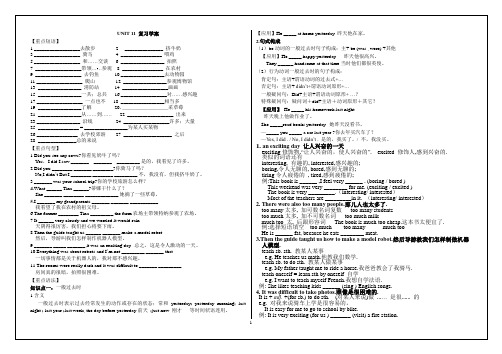
2.句式构成
(1)be动词的一般过去时句子构成:主+ be (was , were) +其他
【应用】He _____ happy yesterday .昨天他很高兴。
They ______ handsome at that time.当时他们都很英俊。
e.g.对我来说骑车上学是很容易的。
It is easy for me to go to school by bike.
例: It is very exciting (for us ) _______ (visit) a fire station.
5.I didn’t like the trip at all.
我一点也不喜欢这次旅游。
not… at all “一点也不;根本不”
e.g.我根本不喜欢吃苹果。
I don’t like apples at all.
例:这幅画一点也不贵.(汉译英)
_______________________________
【巩固练习】
一、根据所给提示完成句中单词。
1. --Alice, here are some g________for your birthday. --Thank you.
teach sb. sth.教某人某事
e.g. He teaches us math.他教我们数学.
teach sb. to do sth.教某人做某事
e.g. My father taught me to ride a horse.我爸爸教会了我骑马.
teach oneself= learn sth by oneself自学
(高一英语教案)新教材高一教案UNIT11(第3课时)-教学教案

新教材高一教案UNIT11〔第3课时〕-教学教案(Pre-reading \Reading\Post-reading)Step 1 Pre-reading1. Checking homework1) T asks the question: Do you play any musical instrument What is your favourite instrument In this way, Ss review names of kinds of musical instrument.1) T asks another question: Has anybody got any information about musical styles Ss tell different kinds of music, such asblues\hip-hop\rap\Latin music etc.Here is some information about music:Music is a language that is spoken to everyone—from the day we are born we hear music of some kind of our lives. But there are as many different kinds of music as different languages, and it is impossible to describe them all. Here are just a few well-known types.Classical music is serious Western European music from the Middle Ages(1500) to the present and it was often written for a large orchestra,or for a small group of players. Many instruments can be used. A lot of music was also written to be sung as opera. Classical music is very popular and schools often teach this type of music.Jazz developed in the Southern States of North America at the beginning of last century. The black people of these states, who were originally slaves from Africa, had their own rhythms. Jazz brought classical music and African rhythms together.Blues was originally Black Country music, which also came from the Southern States of last century. It is slow, usually sad music, which is often sung by one person with a guitar.Rhythm and blues developed from the Blues in America in the 1940s. It became faster and more complex and used more instruments, e.g. saxophone, guitar, piano, drums. The music was often about city life and white musicians started playing it as well.Musicians in the 1950s developed Rock from Rhythm and Blues and it became popular with young people. It spread to Europe in the 1960s and is now known in most countries. A lot of pop music comes from Rock and Roll.Pop music developed from Rock and Roll in America, Britain and Europe in the 1960s and is now in every country. The name is used for most commercial music, i.e. music we can buy on records and hear on “pop radio〞. It is usually played by groups who often use electricinstruments and make videos to go with their records.2. Pair-workHave Ss discuss these questions in pairs.1) What kind of music do you like2) When you listen to a song, do you listen to words or the music2) Do you like to listen to music form other countries3. A gamePlay some music played by different musical instruments, ask the Ss to guess what makes the song. (piano/guitar/trumpet/drum)Teach the English names of different musical instruments on the slide: violin, trumpet, guitar, jazz drum, mouth-organ, huqin(Chinese violin) etc.Step 2 Reading1. Fasting readingHave Ss read the passage as quickly as possible to find the answer to the question: How many kinds of music are mentioned in the passage and what are they2. Careful readingHave Ss read the passage carefully and fill in the form below according to the passage.。
Unit11复习学案
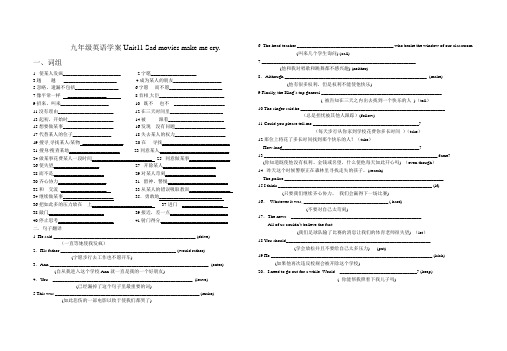
九年级英语学案Unit11 Sad movies make me cry.一、词组1. 使某人发疯________________________2.宁愿___________________3.越------越-----______________________4.成为某人的朋友____________________5.忽略,遗漏不包括__________________6.宁愿----而不愿______________________7.像平常一样________________8.首相,大臣___________________________9.招来,叫来____________________ 10. 既不----也不---_____________________ 11.没有理由_______________________ 12.在三天时间里______________________ 13.起初,开始时___________________ 14.被--------跟着_______________________ 15.想要做某事_____________________ 16.发现---没有问题_____________________ 17.代替某人的位子________________ 18.失去某人的权力_____________________ 19.搜寻,寻找某人/某物_________________ 20.在----寻找____________________________ 21.搜身/搜查某地_____________________ 23.同意某人_____________________________ 24.做某事花费某人一段时间_________________________ 25. 同意做某事_________________ 26.使失望___________________ 27. 开除某人______________________28.而不是_____________________ 29.对某人苛刻_____________________30.齐心协力____________________ 31. 留神,警惕_________________________ 32.和---交流___________________ 33.从某人的错误吸取教训_________________ 34.继续做某事_____________________ 35.勇敢地__________________________ 36.把如此多的压力放在---上_________________________ 37.进门_________________ 38.敲门_______________________ 39.接近,差一点________________________ 40.停止思考_______________________ 41.射门得分____________________________ 二.句子翻译1. He said ___________________________________________________________.(drive)(一直等她使我发疯)2.His father ________________________________________________.(would rather)(宁愿步行去工作也不愿开车)3.Ann __________________________________________________________________. (enter) (自从我进入这个学校Ann就一直是我的一个好朋友)4.You __________________________________________________________. (leave)(已经漏掉了这个句子里最重要的词)5.This was ____________________________________________________________.(make)(如此悲伤的一部电影以致于使我们都哭了) 6. The head teacher ________________________________________ who broke the window of our classroom.(叫来几个学生询问) (call)7.________________________________________________________________ .(他和我对唱歌和跳舞都不感兴趣) (neither)8.Although ___________________________________________________________. (make)(他有很多权利,但是权利不能使他快乐)9.Finally, the King’s top general __________________________________________________.( 被告知在三天之内出去找到一个快乐的人)(tell)10.The singer said he ____________________________________________________________.(总是担忧被其他人跟踪)(follow)11.Could you please tell me ____________________________________________?(每天步行从你家到学校花费你多长时间)(take)12.那位上将花了多长时间找到那个快乐的人?(take)How long_________________________________________________________?13.________________________________________________________________________ fame?(你知道既使他没有权利、金钱或名望,什么使他每天如此开心吗) (even though)14. 昨天这个时候警察正在森林里寻找走失的孩子。
高一英语学案Unit11Unit12(B1)新课标 人教版
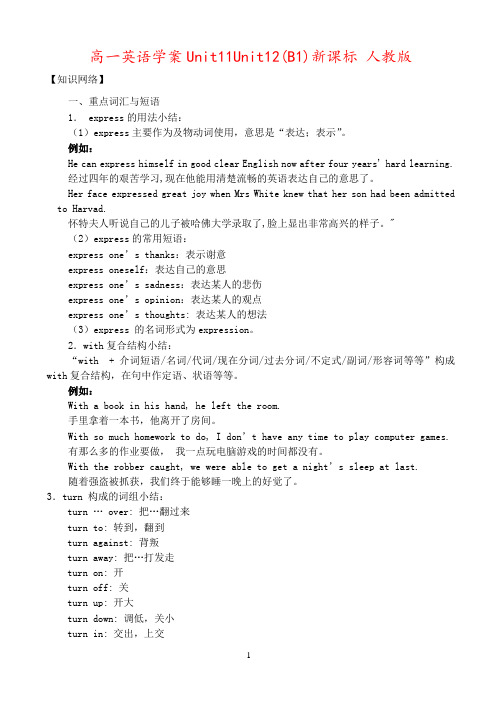
高一英语学案Unit11Unit12(B1)新课标人教版【知识网络】一、重点词汇与短语1. express的用法小结:(1)express主要作为及物动词使用,意思是“表达;表示”。
例如:He can express himself in good clear English now after four years' hard learning.经过四年的艰苦学习,现在他能用清楚流畅的英语表达自己的意思了。
Her face expressed great joy when Mrs White knew that her son had been admitted to Harvad.怀特夫人听说自己的儿子被哈佛大学录取了,脸上显出非常高兴的样子。
"(2)express的常用短语:express one’s thanks:表示谢意express oneself:表达自己的意思express one’s sadness:表达某人的悲伤express one’s opinion:表达某人的观点express one’s thoughts: 表达某人的想法(3)express 的名词形式为expression。
2.with复合结构小结:“with + 介词短语/名词/代词/现在分词/过去分词/不定式/副词/形容词等等”构成with复合结构,在句中作定语、状语等等。
例如:With a book in his hand, he left the room.手里拿着一本书,他离开了房间。
With so much homework to do, I don’t have any time to play computer games.有那么多的作业要做,我一点玩电脑游戏的时间都没有。
With the robber caught, we were able to get a night’s sleep at last.随着强盗被抓获,我们终于能够睡一晚上的好觉了。
八年级英语上:Unit 11 Could you please clean your room学案 人教新目标版
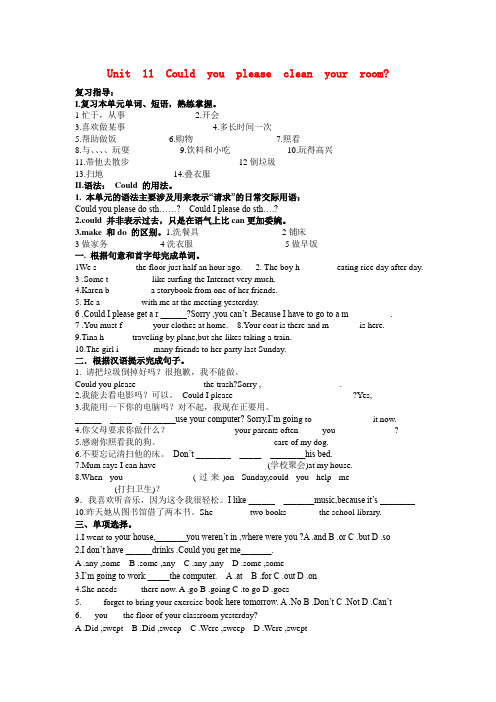
Unit 11 Could you please clean your room?复习指导:I.复习本单元单词、短语,熟练掌握。
1忙于,从事________________2.开会______________________3.喜欢做某事____________________4.多长时间一次______________________5.帮助做饭____________6.购物___________________7.照看________________8.与、、、、玩耍___________ 9.饮料和小吃_____________10.玩得高兴____________11.带他去散步_________________________12倒垃圾_______________________13.扫地________________14.叠衣服__________________II.语法:Could 的用法。
1. 本单元的语法主要涉及用来表示“请求”的日常交际用语:Could you please do sth……? Could I please do sth….?2.could 并非表示过去,只是在语气上比can更加委婉。
3.make 和do 的区别。
1.洗餐具___________________2铺床____________________3做家务____________4洗衣服_____________________5做早饭________________一. 根据句意和首字母完成单词。
1We s_________the floor just half an hour ago. 2. The boy h ________eating rice day after day.3 .Some t__________like surfing the Internet very much.4.Karen b _________a storybook from one of her friends.5. He a _________with me at the meeting yesterday.6 .Could I please get a r ______?Sorry ,you can’t .Because I have to go to a m _________.7 .You must f ______ your clothes at home. 8.Your coat is there and m_______is here.9.Tina h______ traveling by plane,but she likes taking a train.10.The girl i________many friends to her party last Sunday.二.根据汉语提示完成句子。
七下英语Unit 11 学案

Unit 11 Section A (1a-2c)【学习目标】掌握新单词及一般过去时,并谈论过去的事情。
【自主探究】1.回忆一般现在时态与现在进行时态的定义1) 小明经常打篮球。
____________________________________.此句为____________时态,表示______________________的动作,常与时间状语often ________ ________等连用。
2) 小明现在正在打篮球。
____________________________________.此句为____________时态,表示______________________的动作,常与时间状语now等连用。
2. 一般过去时态的定义:表示过去某一段时间发生的动作或存在的状态,也表示过去常常或反复发生的动作,常与表示过去的时间状语连用,例如last year,yesterday,yesterday morning, in 1998, two days ago, this morning, just now 等等。
一般过去时态的构成, 详见书114页。
※有些动词的过去式变化是不规则的, 详见书141页。
练一练:我去年在一家医院上班。
I _______ in a hospital ______ _______.否:I ________ _______ in a hospital ________ ______.一疑:_____ you ______ in a hospital _______ _________?Yes, I _______. / No, I __________.划线提问:_____________________________________________________________________________3. I learned something. 翻译:______ you _______ __________? Yes, I did.I _______ _________ ___________. (否定句) = I __________ ____________.4.- Did you see any cows ?- Yes, I did . I saw quite a lot (of cows) 翻译:_____________________ 【夯实基础】1. We _________(enjoy ) ourselves last weekend.2. Tom played football yesterday afternoon.(否)Tom _______ _______ football yesterday afternoon.3. _________ (be) it cold in your city yesterday?4. 昨天下午我去看望我叔叔了。
- 1、下载文档前请自行甄别文档内容的完整性,平台不提供额外的编辑、内容补充、找答案等附加服务。
- 2、"仅部分预览"的文档,不可在线预览部分如存在完整性等问题,可反馈申请退款(可完整预览的文档不适用该条件!)。
- 3、如文档侵犯您的权益,请联系客服反馈,我们会尽快为您处理(人工客服工作时间:9:00-18:30)。
Unit11复习学案一、单词1.挤奶_______2.奶牛_______3.马_______4.喂养_______ (过去式) _______5.农民_______ (农场) _______6.相当_______7.任何东西_______8.种植_______ (过去式) _______9.采摘_______10.优秀的_______11.乡村_______12.昨天_______13.花_______14.担心_______ (形容词) _______15.幸运地_______ (形容词) _______ (名词) _______16.太阳_______ (形容词) _______17.博物馆_______18.火灾_______19.油画_______ (动词) _______20.使人兴奋的_______ (动词) _______ (感到兴奋的) _______21.可爱的_______ (动词) _______22.昂贵的_______ (同义词) _______ (反义词) _______23.缓慢的_______ (副词) _______ (反义词) _______24.快的_______25.机器人_______26.导游_______27.礼物_______28.所有事情_______29.感兴趣的_______ (名词) _______ (有趣的) _______30.黑暗的_______31.听见_______ (过去式) _______二、重点短语1.挤牛奶___________2.喂鸡___________3.骑马___________4.与某人交谈___________5.带某人参观___________6.学到很多…___________7.摘苹果___________8.许多___________9.去钓鱼___________10.在乡村___________11.消防站___________12.一路上看到…___________13.总的说来___________14.对…感兴趣___________15.一点也不___________三、重点句子1.-你的学校郊游怎么样?-它好极了.2.-你去动物园了吗?-不,我没去.我去了农场.3.-你看见一些奶牛?-是的,我看见了.我看见了许多.4.-Carol骑马了吗?-不,她没有.但是她挤牛奶了.5.-草莓好吗?-是的,它们是好的.不,它们不好.6.我和我的爷爷一起喂鸡了.7.那里的天气怎么样?8.你真幸运.9.导游教我们如何做机器人模型.10.我为我父母买了一些可爱的礼物.11.我对那不感兴趣.12.我一点儿也不喜欢这次旅行.四、语法(一)一般过去时的基本用法一般过去时表示过去某个时间发生的动作或存在的状态,也可表示过去经常或反复发生的动作。
常和表示过去的时间状语连用,如yesterday, last week, last night, in 2003, two days ago等。
【举例】I got up at 6:30 yesterday. 我昨天6:30起床。
My father was very busy last week. 我父亲上周很忙。
(二)动词过去式构成1.规则变化:(1) 一般在动词后加-ed。
如:play—played, look—looked(2) 在以字母e结尾的动词后,只加-d。
如:like—liked, ,hate — hated(3) 在以“辅音字母+y”结尾的动词后,则改y为i,再加—ed。
如:study— studied.(4) 在以单短元音的重读闭音节结尾且,末尾只有一个辅音字母的动词后,双写最后一个辅音字母,再加-ed。
如:plan—planned, stop—stopped2.不规则变化(课本P142)(三)一般过去时的基本结构⑴肯定句“主语+动词过去式+其他”或者“主语+was/were+其他”。
【举例】I played tennis last weekend. 我上周末打网球了。
My school trip was great. 我的学校郊游棒极了。
⑵否定句“主语+didn’t+动词原形+其他”或“主语+wasn’t/weren’t+其他”。
【举例】The girl didn’t play computer games yesterday afternoon. 这个女孩昨天下午没玩电子游戏。
Ol d Henry wasn’t happy last Fri day. 上星期五老亨利不高兴。
⑶一般疑问句“Did+主语+动词原形+其他?”肯定回答为“Yes,主语+did”,否定回答为“No,主语+didn’t”或者“Was/Were+主语+其他?”肯定回答为“Yes,主语+was/were”,否定回答为“No,主语+wasn’t/weren’t”。
【举例】— Did you go to the beach? 你们去海滩了吗?(四)课后练习一.写出下列动词的过去式。
1.am/is _______2.d o _______3.go ________4.have _______5.isn’t _________6. aren’t ________7.spend________8.cook_______9.read______10.cl ean _______ 11.live_______12.study_________13.rid e________14.take_________15.eat_____二.用括号内所给词的适当形式填空。
1. We _________ (enjoy) ourselves at the party last night.2.Jack ____________ (study) for the English test last Sunday.3._______ you ______ (go) to the Great Wall last year?4. What day _______ (be) it yesterday?5.The old man _______(be)ill and went to see a d octor.6.We ________ (have) a party last night.7.We __________ (visit) the museum and went home.8.— How _______ (be) the stud ents? — They were very friendly.9.He often _______ (have) dinner at home. Today he ______ (have) dinner at school.10.We had great fun _______ (play) in the water.11.That made me ______ (feel) very happy.12.— ______ he _______ (have) lunch at nine? —No, he didn’t.13.They _________(buy) a guitar yesterday.14. I ____________(go) to the park last weekend.16. When ___________Sam ____________(d o) his homework last night?17. Linda _____________(clean) the room yesterday.18. He often ______(play) basketball after school when he was a student.19. They ____________(be)very happy to hear the good news yesterday.20. I _______________(see) him today. He went to see his grandmother.21. I ______________(be) busy last week.22. There ____________(be) a l ot of people in this village five years ago.23. I _______________(buy) a new dictionary the day before yesterday.24. She _______________(give) me a book a moment ago.25. The girl _______________(get) up early this morning.26. They _______________(take) photos near the river an hour ago.27. He __________________(not draw) pictures yesterday evening.28.Mr Green _____________(come) to visit me last night.29. They _____________(make) him work twelve hours a day last year.30. I _______________(see) him in the library two days ago.巩固练习一.单项选择( ) 1. --__________. -- It was pretty good.A. How did you do it?B. How was your trip?C. What did you do?( ) 2. ________ you ________ to Lucy’s birthday party yesterday?A. Do, goB. Does, goC. Did, go( ) 3. Cathy and Ruth ________ the classroom every day.A. clean B .cleans C. cleaned( ) 4. --________ you at home last night? -- Yes. But my brother _________ not at home. A. Were, was B. Were, is C. Are, was( ) 5.What ____ you _____ at the meeting ? A.do,say B.did .say C.did, said( ) 6.He _______ a letter just now . A,writes B. is writing C. Wrote()7. The boy _____ only eight years old then 。
